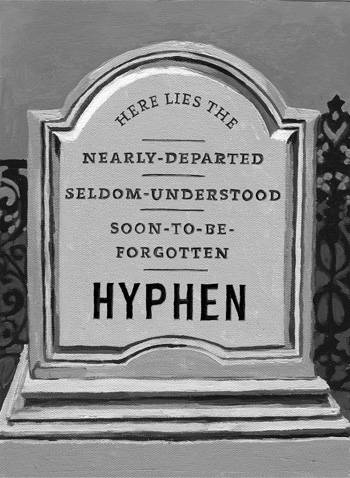The Hyphen Is There To Fill The Void
The term Italian-American (with or without the hyphen) remains as ambiguous a description to me today as it did while growing up in a mixed New York City neighborhood some 30 years ago. I often found myself more “Italian” than the other kids, but yet such an American when my parent’s friends or my Italian cousins would visit from Italy.
I have what is now considered the unique distinction of being a forty something first generation Italian-American. Growing up in Queens, most of my friends who were “Italian” where grandchildren or great grandchildren of Italian immigrants. Sunday dinners were long gone for them, and any knowledge of the vernacular was limited to curse words. They were still proud of their heritage; albeit the little knowledge they possessed of it. They exhibited this pride with flags and mini banners hanging from the rear view mirrors of their new Monte Carlos. The driver’s seats leaned so far back to ensure an angle around the banner in order to see the boulevard as the car sauntered up and down it. The boys were weighed down with gold chains hanging around their tanned necks (a great contrast to the a-line undershirts they wore). The girls were there for the looking and the taking. You really couldn’t avoid seeing them as their hair stood about a foot high off their heads. Needless to say I had a hard time fitting in.
It seems I was caught in a very limited, almost nonexistent category; the first born child of an Italian, who arrived in New York a year before my birth. When my father, the Italian married my mother, the first generation Italian- American, he did not speak any English. He insisted that the language spoken in the house be English. He needed to secure employment worthy of his education and Italian military training. He truly came to this country for love not money. I can remember listening intently to the unavoidable, weekly, animated discourse that was always conducted in Italian. These always occurred when company was over the house on the weekend. I loved the language and felt cheated that I did not fully understand them. We were fortunate enough to be able to spend a few weeks in intermittent years in Italy with family. As a child the language came to me more quickly, but would fade after being home a few months.
To say that I loved everything Italian would be a gigantic understatement, and I still do. It seemed, however that my idea of things Italian was very different from a lot of my neighborhood friends and schoolmates. I had never eaten a meatball in my life, and I had no idea what kind of “gravy” went on top of my “macaroni”, but it hardly ever included all that RED. I didn’t know a lot of Italian words that they knew; like Sfacheem (?) or Gabatost(?). (Your guess is as good as mine.) Perhaps the most cavernous difference between us was our actual lifestyle. We lived in the same neighborhood, and went to the same schools, but their houses were so much more elaborate, and the cars their parents drove must have cost a year’s salary. In my house nothing was more important than education; it wasn’t that way for a lot of my friends. Making money was the priority, school, especially for a female was optional.
Being the first person ever in my entire family to attend a university was something of a burden. I left most of the gang behind, determined to make my parents and myself proud as I pursued my pharmacy degree. Also important to me was finding a soul mate which I was certain would happen at local St. John’s University. This was not to be. These guys all ate meatballs too! One has to realize that at St. John’s University in the 1980’s there was a plethora of Italian American guys to choose from. The students in pharmacy school were more serious, bright and diligent than I had ever encountered, but their “italianess” was still so different from mine. I concentrated on my studies, made new friends, dated some guys and satisfied my need for italianess with my present company. I was finally finding my place, I would stop trying to be an Italian; I was born in New York after all. I was one of them. But then my cousin would call from Bologna and we’d fill each other in on the news and I’d feel Italian again. No one I knew at St. John’s knew who Eros Ramazzotti was. I knew, I cared, I tried to share but Springsteen always won out. I would always be stuck in the void; not a true Italian, in denial about labeling myself Italian American.
I recall my father’s advice while I was dating a Staten Islander in college. My Dad sat me down and told me in scary seriousness, to get rid of my romantic notions about these Italian kids here (in NY). He told me to find myself a German or an Irishman, as long as they were your equal, loved you, and treated you like gold. It didn’t happen.
And so it was in the mid eighties, our family had their first college graduate; a white coated Pharmacist (Dottoressa to my father). It was at this same time that the other part of my life changed as well. His nephew and my little brother played junior soccer together. We met at a game. He was handsome, educated, well mannered, and soft spoken and his last name ended with a vowel! When I learned that each of his parents was born in Italy, I was in love. He was stuck in the hyphen space between Italian and American just as I was.
We settled in the suburbs with our two young children, and reality really set in. Not only were we missing Italiani, but these people hardly even cooked meatballs. Our children grew up among the “Olive Garden” genre as we later named them. One day I turned around and they were as much (or as little) Italian-Americans as any in the suburbs. Visits from Nonno and Nonna kept up traditions and some cultural knowledge, but these kids were fading fast.
My husband and I would speak to each other in our broken Italian so at least the kids would have some exposure, but they would just laugh. We managed to take them on a spectacular trip to Italy several years ago, sort of a family reunion with my father’s town of Rimini as the base. They couldn’t help themselves, they loved everything about it, and they felt like Italians. They made friends with cousins their own age; they became interested in history, art, and cuisine. They were sad to leave.
Last month my very dramatic high school aged daughter informed me that with all her heart she wanted to live in Italy; maybe be a teacher there. My son was recently accepted into medical school here in New York, it was wonderful news and the whole family celebrated with him bursting with pride over his accomplishment. A few weeks later he gave me even better news. News that admittedly brought all my senses to life and lightened my heart. My brilliant, analytical pre-med math/science guy is going to spend a semester in Siena Italy, studying the language, the art and the culture of his roots.
They get it!





































i-Italy
Facebook
Google+
This work may not be reproduced, in whole or in part, without prior written permission.
Questo lavoro non può essere riprodotto, in tutto o in parte, senza permesso scritto.